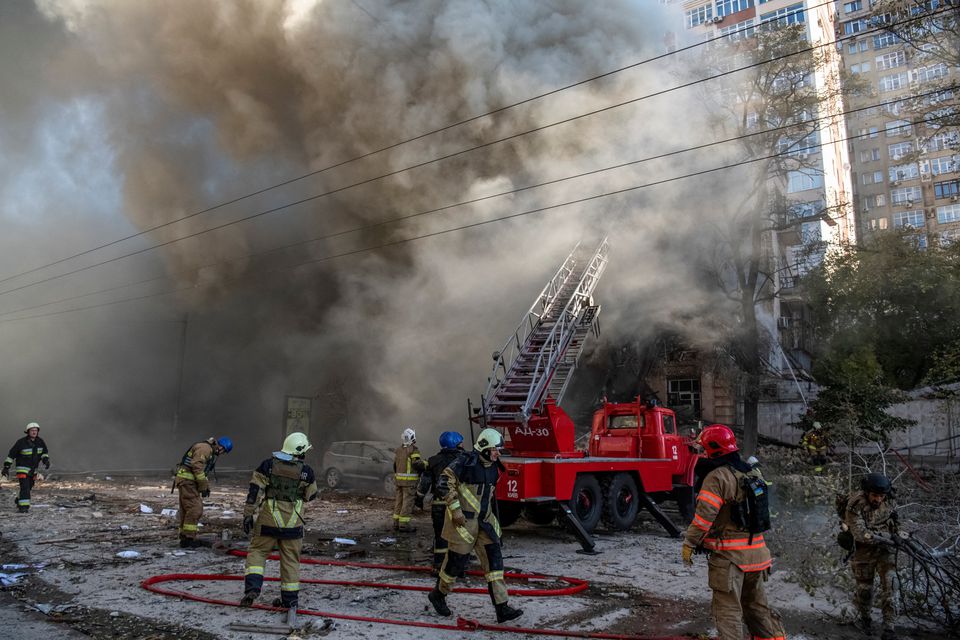By Agency Report
Ukraine said Russia had destroyed almost a third of its power stations over the past week as Moscow stepped up a pre-winter campaign to strike infrastructure, a move the West says is a calculated attempt to disrupt and demoralise.

Missiles struck power-generating facilities in a clutch of Ukrainian cities home to millions of people and several people were killed. Moscow acknowledged targeting energy plants, while Ukraine said water infrastructure had also been hit.
At least one man died when a Russian missile reduced his apartment in the southern river port of Mykolaiv to rubble.
“They (Russians) probably get pleasure from this,” said Oleksandr, the owner of a local flower shop damaged in the attack.
“They get pleasure from us feeling bad. I think they want us to bomb and shell (their) city buildings. But we won’t do that to be different from them.”
Another two people were reported killed in a strike in Kiev.
Ukrainian President Volodymyr Zelensky said Russia was continuing to try to terrorise and kill civilians.
“Since Oct. 10, 30 per cent of Ukraine’s power stations have been destroyed, causing massive blackouts across the country,” he wrote on Twitter.
Power cuts were reported in parts of Kyiv, many parts of the Zhytomyr region west of the capital and Dnipro, which, like Mykolaiv, is in the south but also far from the front line where Ukraine is pressing Russian forces occupying its southeast.
Zelensky reiterated his refusal to negotiate with Russian President Vladimir Putin whom he has accused of immorality.
“The terrorist state will not change anything for itself with such actions,” he wrote on the Telegram messaging app.
“It will only confirm its destructive and murderous essence, for which it will certainly be held to account.”
Putin has dismissed Zelensky as a puppet of Washington, which has given Kyiv more than $17.5 billion in security aid.
There was no immediate word on how many people had been killed in Tuesday’s strikes overall, which came a day after Russia sent swarms of drones to attack infrastructure in Kiev and other cities, killing at least five people.
Moscow denies deliberately targeting civilians, though it has pummelled villages, towns and cities across Ukraine during what it calls a “special military operation” needed to ensure its security against NATO by rooting out anti-Russian elements.
The Russian defence ministry, whose troops have this month been forced to retreat on two separate fronts, reiterated that it was carrying out attacks on military targets and energy infrastructure across Ukraine with high-precision weapons.
It has deployed both missiles and drones.
Russia earlier this month named General Sergei Surovikin as the overall commander of Moscow’s forces in Ukraine. Surovikin served in Syria and Chechnya where Russian forces pounded cities to rubble in a brutal but effective scorched earth policy against its foes.
Nicknamed “General Armageddon” by the Russian media because of his alleged toughness, his appointment was followed by the biggest wave of missile strikes against Ukraine since Moscow invaded on Feb. 24.
Putin cast those strikes as revenge for what he said was a Ukrainian attack on the bridge which links Russia to Crimea – the peninsula Russia annexed from Ukraine in 2014.
At least three people were killed in the bombing for which Ukraine has not officially taken responsibility.
British Armed Forces minister James Heappey told BBC Radio that Surovikin was pursuing a cruel and pointless strategy.
“The new general commanding the Russian operation is wasting some of his most potent and valuable weapon systems against civilian targets hundreds of miles away from … the front line,” said Heappey.
“He is doing so to cause terror to try and break the will of the Ukrainian people. I can promise him that that will definitely not be achieved.”
The mayor of Zhytomyr, a city of 263,000 people, said that Tuesday’s attacks had knocked out the power and water supply, while two explosions rocked an energy facility in the city of Dnipro, a city of nearly one million, causing serious damage, according to Tymoshenko, the Ukrainian presidential aide.
A witness heard blasts and saw smoke rising in Kyiv, the capital. The Kyiv City Prosecutor’s office said two people had been killed and one wounded in a Russian missile strike on an energy supply facility there.
There were reports too of power facilities being targeted in Kharkiv, a city with a pre-war population of 1.43 million people close to the Russian border, as well as in Zelensky’s home town of Kryvyi Rih.
In Mykolaiv, a strategic port which Russia tried and failed to capture earlier in the war, a Reuters witness said they had heard three explosions in the early hours of Tuesday.
A missile had completely destroyed one wing of a building in the downtown area, leaving a massive crater, they said. A fire crew was seen pulling the dead body of a man from the rubble.
“In Mykolaiv, the enemy destroyed a residential building with S-300 missiles. A person died. There was also a strike at the flower market, the chestnut park.
“I wonder what the Russian terrorists were fighting against at these absolutely peaceful facilities?” Zelensky said.
The governors of Russia’s Kursk and Belgorod regions, which border Ukraine, on Tuesday reported cross-border shelling.
In Belgorod, a train station was shelled and train links suspended, and two villages were shelled in Kursk, leading to electricity outages, they said.